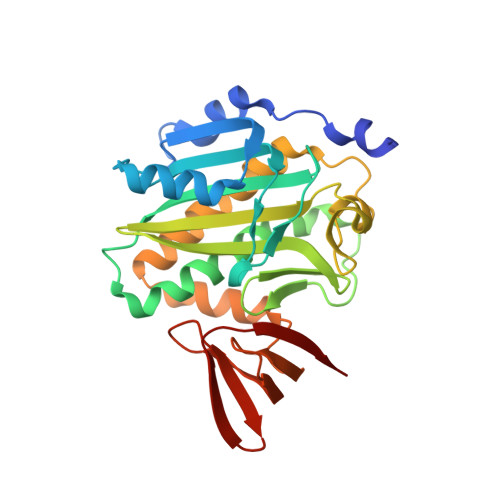Targeting Mycobacterium tuberculosis Biotin Protein Ligase (MtBPL) with Nucleoside-Based Bisubstrate Adenylation Inhibitors.
Bockman, M.R., Kalinda, A.S., Petrelli, R., De la Mora-Rey, T., Tiwari, D., Liu, F., Dawadi, S., Nandakumar, M., Rhee, K.Y., Schnappinger, D., Finzel, B.C., Aldrich, C.C.(2015) J Med Chem 58: 7349-7369
- PubMed: 26299766
- DOI: https://doi.org/10.1021/acs.jmedchem.5b00719
- Primary Citation of Related Structures:
4XTV, 4XTW, 4XTX, 4XTY, 4XTZ, 4XU0, 4XU1, 4XU2, 4XU3 - PubMed Abstract:
Mycobacterium tuberculosis (Mtb), responsible for both latent and symptomatic tuberculosis (TB), remains the second leading cause of mortality among infectious diseases worldwide. Mycobacterial biotin protein ligase (MtBPL) is an essential enzyme in Mtb and regulates lipid metabolism through the post-translational biotinylation of acyl coenzyme A carboxylases. We report the synthesis and evaluation of a systematic series of potent nucleoside-based inhibitors of MtBPL that contain modifications to the ribofuranosyl ring of the nucleoside. All compounds were characterized by isothermal titration calorimetry (ITC) and shown to bind potently with K(D)s ≤ 2 nM. Additionally, we obtained high-resolution cocrystal structures for a majority of the compounds. Despite fairly uniform biochemical potency, the whole-cell Mtb activity varied greatly with minimum inhibitory concentrations (MIC) ranging from 0.78 to >100 μM. Cellular accumulation studies showed a nearly 10-fold enhancement in accumulation of a C-2'-α analogue over the corresponding C-2'-β analogue, consistent with their differential whole-cell activity.
- Department of Medicinal Chemistry, University of Minnesota, Minneapolis, MN 55455, USA.
Organizational Affiliation:

















